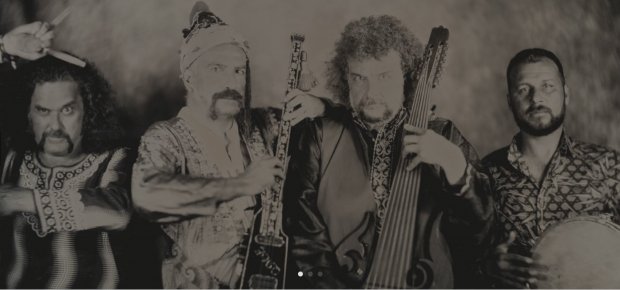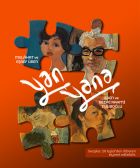The online streaming of the İKSV Jazz Festival concerts is due to finish on November 3. You have been warned! The tap is about to run dry, so now is the time to catch up on what you have been missing at online.iksv.org.https://online.iksv.org/caz
Selecting a concert at random from the menu, I happened upon a performance by two Turkish outfits – Make Mama Proud and BaBa Zula. The stage at the Feriye Palace in Ortaköy is positioned close to the water’s edge, so we have the Bosphorus and the lights of the Asian shore as background. Of the two groups, Make Mama Proud adopts the pessimistic stance so popular with the younger generation (for whom the term ‘Death Metal’ signifies not the traffic on some diabolical urban freeway, but the joys of recreational head-thumping), while BaBa Zula’s interpretation of ethnic rhythms and genres is designed to create a lighter mood in which we can happily give the finger to current troubles.
Make Mama Proud consists of three musicians – Deniz Yurtdaş (electric guitar), Kerem Çınar (vocals and bass guitar) and Parham A.G. (drums). As someone who used to listen to Jim Morrison and Jimi Hendrix in his college days, I am not unfamiliar with heavy music; I will admit, however, that the only way I can cope with the unrelenting emphasis on the more painful aspects of human existence that informs the music of such groups as Make Mama Proud is by acknowledging that in Buddhist philosophy, duhka (‘suffering, unhappiness, stress, the fundamental unsatisfactoriness and painfulness of mundane life’) is the first of the Four Noble Truths.
At 27:03, they launch into Burning Witches, which is currently one of their most celebrated numbers. Not being able to hear most of the words, I cannot tell whether the attitude adopted towards the innocent women who were so brutally murdered during the witch trials is sympathetic or no. What the song did put me in mind of, however, is a story by the American author Nathaniel Hawthorne (born in Salem, Massachusetts, in 1804) entitled Feathertop: A Moralized Legend in which a witch puts life into a scarecrow – with results she has completely failed to anticipate. The story is all the more interesting for the fact that, as Wikipedia tells us, Hawthorne’s ancestors included ‘John Hathorne, the only judge from the Salem witch trials who never repented his involvement.’ One guesses that in Feathertop, the author might have been attempting to address, and lay to rest, a particularly worrisome piece of ancestral karma. Here is a link to this fascinating piece of fiction:
http://www.online-literature.com/hawthorne/135/
Still on the theme of darkness – and after all, Halloween is upon us – in 1876 the Feriye Palace was the scene of a horrific murder. Here, on June 4, Sultan Abdülaziz, who had recently been deposed by Midhat Paşa and his fellow-conspirators in favour of his nephew Murad, the Crown Prince, was found in the bathroom with his wrists cut, having bled to death. Immediately after his deposition, he had been sent to Topkapı Palace; shortly afterwards, in a letter to Murad (who had now become Murad V), Abdülaziz complained that his new accommodation was lacking in modern conveniences, and requested to be transferred to the Feriye Palace. Murad replied that his uncle had been subjected to this inconvenience only because no more suitable accommodation had been available at the time, and promised that the Feriye Palace would be made ready to receive him in a day or two. Ex-Sultan Abdülaziz was duly transferred to the residence of his choice, but shortly afterwards met his end – probably at the hands of the two wrestling trainers he employed to spar with him in his leisure moments (he was a big man, and quite a hunk). As regards responsibility for this foul act of regicide, the finger of accusation must point not to the wrestlers themselves but to the men behind them whose power lay in their political, rather than their physical, clout – that is, to Midhat Paşa and his associates. When Murad heard of Abdülaziz’s murder, he had a nervous breakdown, being plagued by the thought that he would be held responsible for his uncle’s death, in which he had had no part. Midhat Paşa, meanwhile, was tried for the murder by Sultan Abdülhamid II in 1881, and ultimately met his death by violence while in exile.
And so, expressing the hope that the souls of both Sultan Abdülaziz and Midhat Paşa – and indeed those of all victims of violence, both past and present – may find rest and peace (may they have happiness, and the causes of happiness!) – I will now return to the concert by Make Mama Proud, and remark that after a well-coordinated molto ritenuto passage that is a real feat of musicianship (this starts at 44:54), they take their leave in an exceptionally modest way at 46:34.
BaBa Zula, the next group to arrive on stage, begins playing at 46:58. The musicians are as follows: Murat Ertel (vocals, electric saz, stringed instruments, oscillator, theremin), Levent Akman (spoons, percussions, machines, toys) and Ümit Adakale (djembe, percussions). For those not in the know, a djembe is a kind of drum.
The Event Description tells us that ‘world-renowned’ BaBa Zula ‘reflects the slum culture of these lands with its music, stance and costumes.’ Personally, I find their music pleasantly reminiscent of what one used to hear – improved, rather than damaged, by the execrable sound quality – in the minibus or the dolmuş in the 1970s. And the ability of Turkish people to shrug off their misfortunes, turn on the radio (or whatever) and dance till they drop has always called forth my admiration. I congratulate them, by the way, on the anniversary of the inauguration of their Republic on 29th October 1923. We astrologers, of course, treat a country as if it were a child born on the date of that country’s foundation, and so I feel it necessary to point out that in January 2021, the planet Pluto will be making a tense square aspect from Capricorn to the Turkish Republic’s Saturn in Libra – watch out for power plays!
To return to the subject of BaBa Zula, I love the little dance Murat Ertel launches into soon after the beginning of Salıncak (‘The Swing’, which starts at 1:13:23). Another highlight for me is the drum solo at 1:47:23. This is, in fact, the prelude to an extended musical romp that could be well worth twirling to. Enjoy, and remember that everything passes, so … boş ver!








